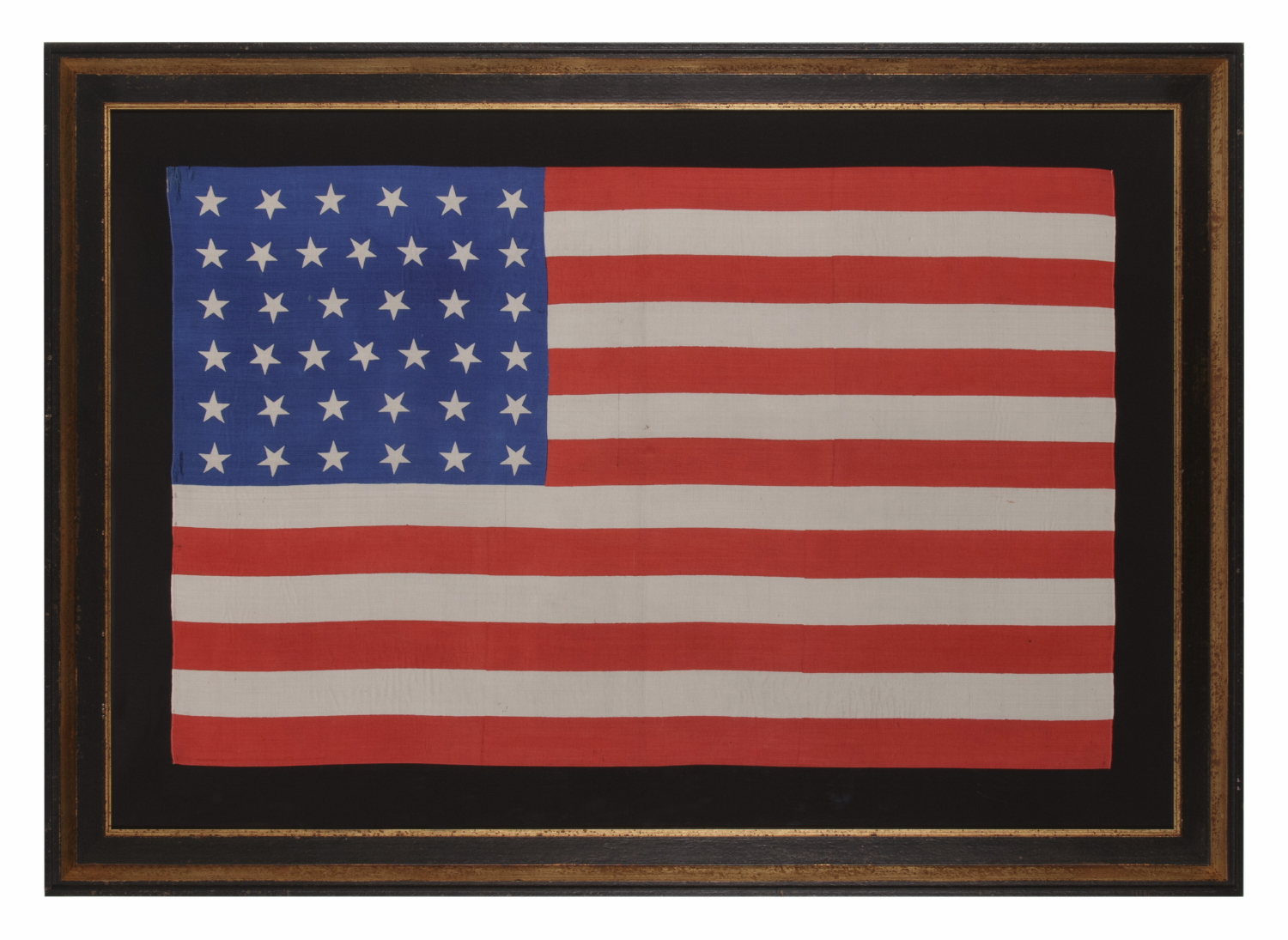
| |
38 DANCING STARS ON A SILK ANTIQUE AMERICAN PARADE FLAG WITH GENEROUS SCALE AND VIVID COLORS, COLORADO STATEHOOD, 1876-1889 |
|
| Available: |
Sold |
| Frame Size (H x L): |
Approx. 42" x 59.5" |
| Flag Size (H x L): |
29.5" x 47" |
|
| Description....: |
|
38 star American national parade flag, printed on silk. The stars are arranged in justified, linear rows of 6-7-6-7-6-6, which is uncommon. Within each row, the stars are oriented consecutively point-up, point down in their vertical alignment, resulting in what I call “tumbling” or “dancing” formation. The colors are bright and vivid. Measuring 2.5 x 4 feet, the flag is rather large in scale among its counterparts, most of which are 3 feet long or smaller. Because most flags of this era with pieced-and-sewn construction were 8 feet long and larger, the size of this particular example—large enough to make a significant statement, but not too large—is not only scarce but desirable; perfect for display over a mantle, behind a desk, over a bed or a hearth.
Colorado became the 38th state on August 1st, 1876. This was the year of our nation’s 100-year anniversary of independence. Per the Third Flag Act of 1818, stars were not officially added until the 4th of July following a state's addition. For this reason, 37 was the official star count for the American flag in 1876. Flag-making was a competitive venture, however, and few flag-makers would have been continuing to produce 37 star flags when their competitors were making 38’s. It is for this reason that 38 and 13 stars (to represent the original 13 colonies) are more often seen at the Centennial International Exposition, the six-month long World’s Fair held in Philadelphia in honor of the event. Some flag-makers would have been adding a star for the 38th state even before it entered the Union, in the early part of 1876 or even prior. In fact, many makers of parade flags were actually producing 39 star flags, in hopeful anticipation of the addition of two more Western Territories instead of one. But the 39th state would not join the Union for another 13 years, when the Dakota Territory entered as two states on the same day. The 38 star flag became official on July 4th, 1877 and was generally used until the addition of the Dakotas in 1889.
Mounting: The flag was mounted and framed within our own conservation department, which is led by masters degree trained staff. We take great care in the mounting and preservation of flags and have framed thousands of examples.
The background is 100% hemp cotton twill, black in color. The black-painted, hand-gilded and distressed molding is Italian. The glazing is U.V. protective plexiglass. Feel free to contact us for more details.
Condition: There is a small area of fabric breakdown in the upper, hoist end corner. There are a few, tiny, bleach spots in the canton. There are very tiny bleach spots in the canton and there are tiny stains in the striped field. The overall condition is excellent for a silk parade flag of this period. |
|
|
|
| Collector Level: |
Intermediate-Level Collectors and Special Gifts |
|
| Flag Type: |
Parade flag |
|
| Star Count: |
38 |
|
| Earliest Date of Origin: |
1876 |
|
| Latest Date of Origin: |
1889 |
|
| State/Affiliation: |
Colorado |
|
| War Association: |
1866-1890 Indian Wars |
|
| Price: |
SOLD |
|
| |
Views: 2283 |
|
|
|

